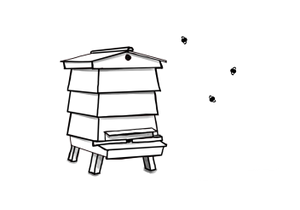How The Ancient Wisdom Of Honey Helps New Mothers
I was peanut-butter-and-honey-sandwiched between two boys growing up. I always imagined giving birth to only boys; it was a wondrous surprise to have two beautiful girls before boy after boy after boy, and then a princess as the grand finale. I hear you counting: six children, never planned. I feel very privileged (and a bit crazy) to have had six children. Now that they are all adults, I can sleep half the night without worrying. The anxiety never leaves you, though. As the saying goes; you are only ever as happy as your unhappiest child, whatever age they are!

On New Year’s Eve my eldest daughter gave birth to a large, healthy, bouncing boy. She and her partner have named him Augustus, after the first Roman emperor. I suggested Ambrose, after Saint Ambrose- the great patron saint of bees. I told her the story of how, as a baby, Ambrose lay in the garden when a swarm of bees settled on him and let off a harmonious buzz before flying away. The bees left behind no sting- just the faintest drop of honey on his rosy lips. His father saw the phenomenon as an indication that his son would one day be great and, sure enough, Ambrose went on to become a fine preacher. He was nicknamed the ‘honey-tongued doctor’ and the golden-hued substance has since become a symbol of eloquence (Shakespeare’s verses have been hailed time again as ‘honey-tongued’); in ancient mythology, the goddesses of art, poetry, and science- otherwise called the Muses- were associated with bees (which were named the “birds of the Muses”). They gave mortals the gift of speech by sending bees to plant honey on their lips and to thereby sweeten their voices.
My daughter Rosie loved the story, but kindly told me to mind my own beeswax! That is the first granny rule: don’t interfere or try to control. In fact, avoid any association at all with being a ‘Queen-bee’. Mothers must work it out for themselves; parenting is a process of trial-and-error, just as bees use the old-fashioned method to efficiently seek out the best route and flowers to pollenate. Just as a child is nurtured from the womb into adulthood, the young Queen bee is fed in royal jelly and reared to become the sole Queen of the hive. This grooming process, which makes her uniquely able to sting repeatedly without dying, marks her out as the ‘warrior princess’ that ancient mythology depicted her as.
Bees are a fitting symbol for newly-emerged motherhood: since ancient times they have been an icon of divine femininity and fertility, and an example of a matriarchal society. One of the oldest deities in the world is the Mother Goddess which is often portrayed as a dancing Queen Bee, surrounded by bee goddesses and priestesses. The Egyptian goddess Neith, believed to be the reincarnation of the Mother Goddess, was a warrior symbol of fertility: she was the mother of the Egyptian God RA, whose tears are believed to have been the origin of the Bee (in the Papyrus it states that “the water which flows from [RA’s] eyes upon the ground turns into working bees”). The prominence of the female bee is, perhaps, owing to the fact that Queen Bees play a larger role in the pollination than their male counterparts: female bees are the workers, whereas male bees exist to reproduce (quite the reversal!). The hives are a-buzz with a kind of bee-version of Game of Thrones.
But back to bee-ing a mother (and a mother’s mother). It is quite an ordeal breast feeding, and I have resisted giving advice. I did think of an unobtrusive way to help, though: beeswax is extremely nourishing and healing. I have melted down some beeswax and added olive oil, shea butter and lavender. I haven’t used specific quantities; I just judged by the consistency. The trick is not to overheat the wax, or you can scorch it. I used wax from my hives, but you can pick up a bees wax candle very easily. I put the balm into a recycled pot and gave it to Rosie to put on her sore nipples! As for her sore stitches, I have given her a pot of honey because of its healing powers. Honey has anti-oxidant and anti-inflammatory properties, and it really does improve healing. These effects are due to honey’s anti-bacterial action, secondary to its high acidity, osmotic effect, anti-oxidant content and hydrogen peroxide content. I am delighted to be able to help with both stitches and sore nipples.

Little Augustus is absolutely adorable. I am thrilled to be able to hold him and help in any way possible. The idea of ‘support’ is tricky; I like to think of a hive where all the nurse bees help the young. The nurse bees nurture and feed bee larvae; they take on the job of processing incoming nectar, feeding the queen as well as making and capping the honey.
My mother tells me tales of spending weeks in hospital after having me and my brothers, as every mother did. All new mothers were kept in hospital to be looked after for at least a week. It is such a new trend to leave hospital as soon as baby is born; I left with most of mine after five hours. I think it is a huge challenge to return home without any support and I would welcome the old way. I thought that I was independent and could cope with no help. On reflection, I really struggled and wish that I had accepted more offers of support.
My advice would be to accept help, and to protect your mental health more than anything else. Fatigue and depression are clearly linked, so take all the support that you can!
Enough of granny; have lots of Beeble honey and toast for breakfast!
Written by Nicola




